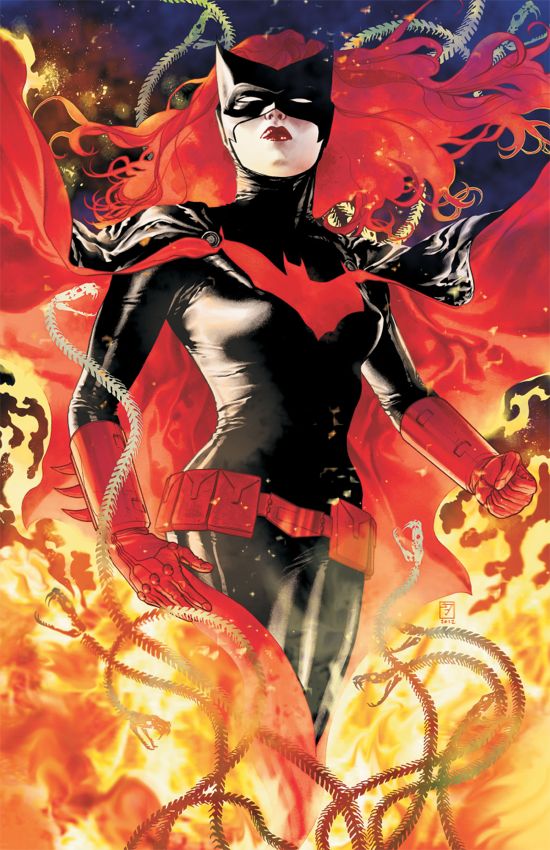 It seems like one can’t type the words “DC Comics” without having to use the words “stupid idea” close by. But the latest stupid idea from DC is getting media attention for all the wrong reasons.
It seems like one can’t type the words “DC Comics” without having to use the words “stupid idea” close by. But the latest stupid idea from DC is getting media attention for all the wrong reasons.
This morning the two writers on DC’s Batwoman book announced they were leaving the title because the editorial staff forbade the title character from marrying her female lover (the much more interesting character, Maggie Sawyer). The revelation of this decision by the Powers that Be has started the predictable wailing and gnashing of teeth, but the majority of complainers have it all wrong. Homophobia didn’t enter into it. DC Comics is just against marriage.
All marriage.
Before the series of reboots, starting in 2005 with Infinite Crisis and culminating two years ago with the “New 52” the DC Universe was full of happily married people. Superman finally married Lois Lane in the late 1990’s. Three generations of Flashes all had wives to whom they were devoted. Ralph and Sue Dibney were a comics version of Nick and Nora Charles: a married couple who solved mysteries together. True, there were some exceptions. Batman showed no interest in getting hitched to anyone but that’s just the way Bats is, and Green Lanterns in particular had less than spectacular histories with loved ones but at least they made an attempt.
No longer. With history wiped (almost) clean in this last reboot, Clark and Lois are no longer together. Barry (Flash) Allen is not married to Iris West. Every long-standing romantic relationship is turned on its head unnecessarily. And DC hardly deserves all the blame for this trend. After all, Marvel started it.
But comics aren’t the only culprits in this war on fictional marriage. I myself have been a willing participant.
When Sidekick was picked up by its wonderful publisher editorial changes were obviously going to follow, and the first change that was made by mutual agreement was that of Bobby’s marital status. The original ending to the book included Sarah accepting a marriage proposal from Bobby, and the epilogue showed them almost a year later as a married couple. When the publisher told me they wanted a sequel to be published a year after Sidekick hit the shelves, I immediately told my editor that I wanted to rewrite the last two chapters to take out the marriage so I could keep the romantic entanglement between the two characters as a plot thread in later books.
Imagine my surprise when I found out the marriage was at the top of the lists the publisher wanted changed, but for different reasons. Their argument was that teens would have a hard time identifying with a married character. I truly had never thought of that, and I don’t necessarily agree with the idea. If it hadn’t been for the needs of a second book in the series (which also led to the decision to de-age Bobby by a year) I might have fought the decision. In the end, it was the right choice, and it did open up new avenues for the characters as the story continues.
But now I wonder what if I hadn’t made the decision, or agreed with an editorial change, to wipe out Bobby’s marriage? True, most of the plot of Brothers in Arms (no spoilers) would have worked out differently but I couldn’t honestly say it wouldn’t have been possible. The plot complications that I threw into their romance wouldn’t have been as simple but married couples have complications all their own. In literary terms, it’s no more a challenge to have a married couple cope with challenges in their home life than to have two lovers face romantic entanglements. And it would probably involve fewer sex scenes, which would keep the books from getting banned as often.
It’s not even just a question of YA characters marrying, proposing, or even considering marriage. My buddy over at The YA Dogtown recently had a great article about how YA really gives parents the shaft. The YA landscape is littered with the remains of divorces, dead parents, or absent parents. There are logical reasons for not featuring parents too prominently in YA literature, but at least their presence should be acknowledged. And there’s no reason why a YA protagonist should be automatically be excluded from having two parents (of either gender, I’m not picky) in a happy, or at least functional, marriage.
No, as far as my own decision to keep Bobby single, je ne regrette rien. It was right for the character and it made for a better story. But looking at a larger picture, I do have to wonder what kind of message are we sending to teens about the institution of marriage? When people are fighting for the right to get married, are we perhaps discouraging teens from even thinking about making their relationships permanent somewhere down the road?
Something to think about.
“are we perhaps discouraging teens from even thinking about making their relationships permanent somewhere down the road?”
I have to ask, why does marriage mean “permanent”? The article is good, you make many good points, but I think you finish on the wrong thought. Thanks